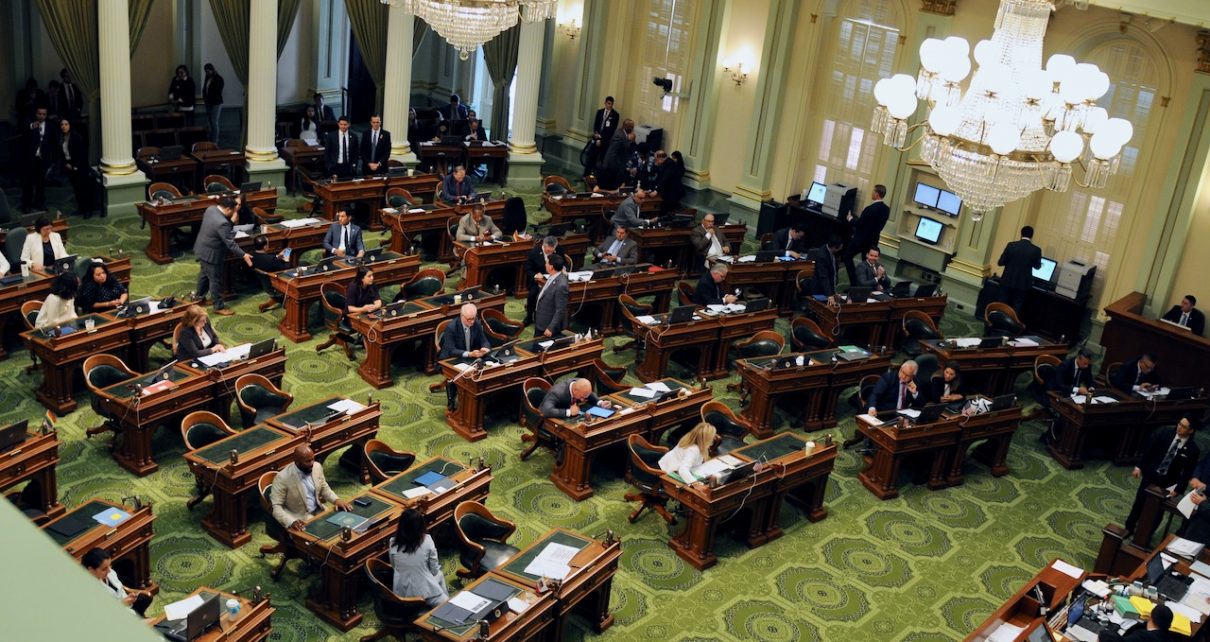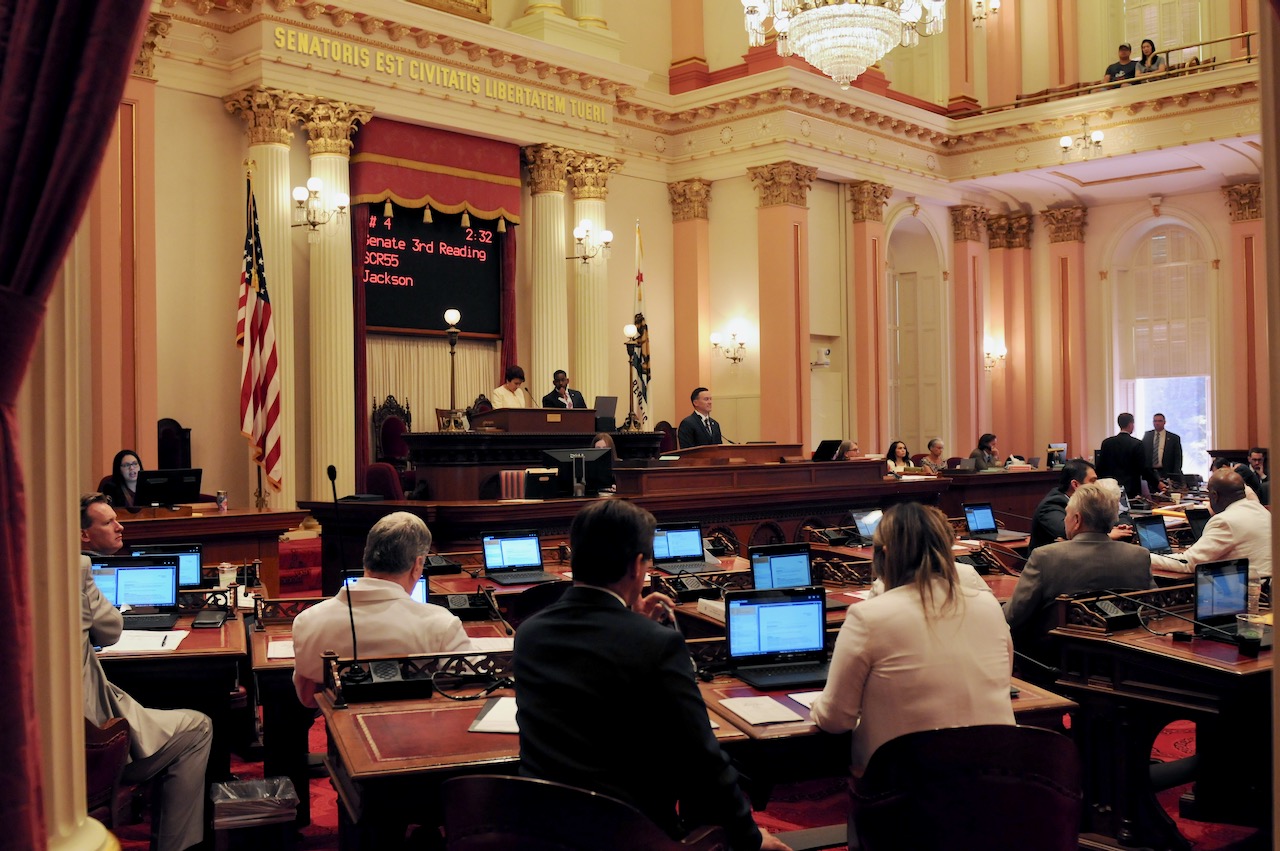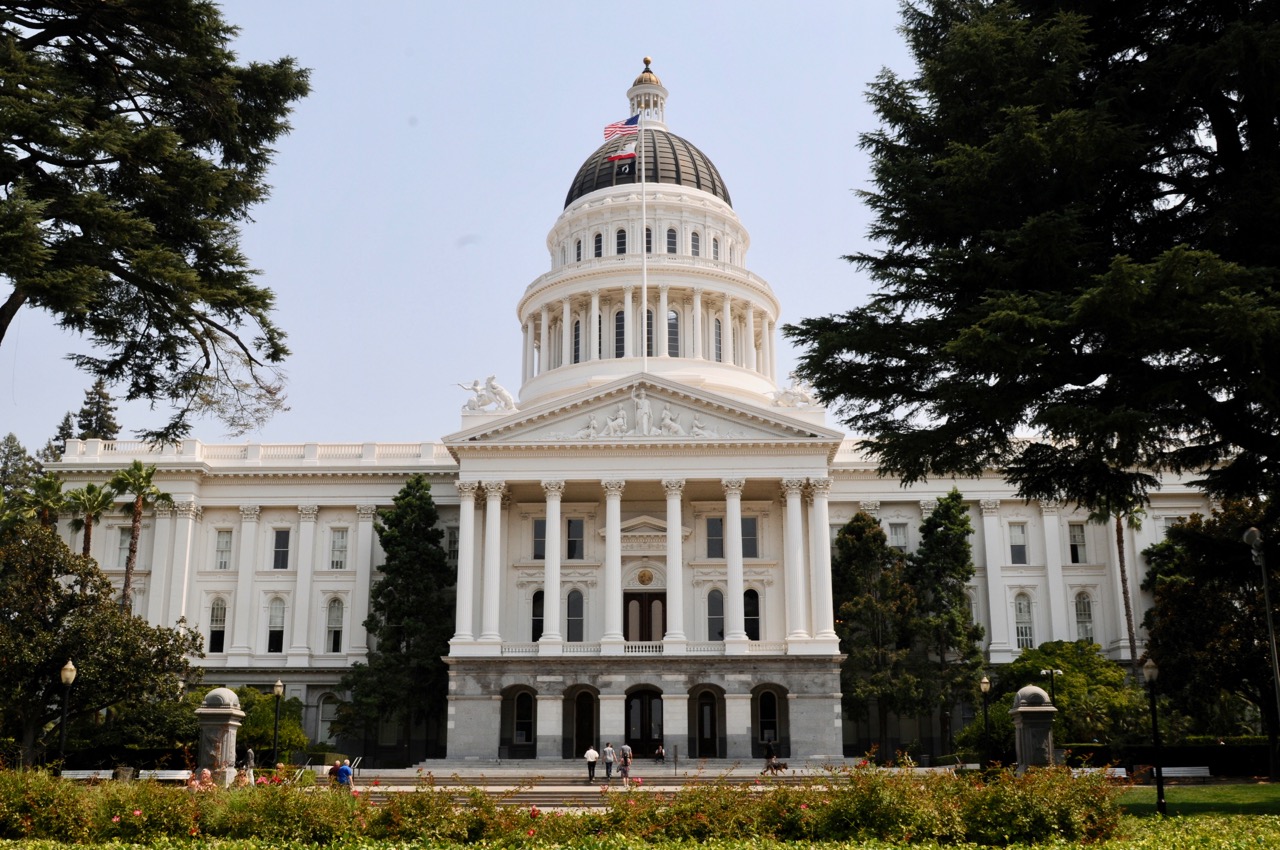
California State Assembly Chamber. (Photo: Kevin Sanders for California Globe)
Conducting Business on the Floors of the California Legislature
Making the Houses Run Smoothly: Assembly Chief Clerk and Senate Secretary
By Chris Micheli, October 25, 2019 8:38 am
The California Legislature conducts its business both in policy and fiscal committees, as well as on the Floors of the State Assembly and State Senate. Each house determines its own rules and specifies how business will be handled on their respective floors. This process of conducting their activities on the Floors is called the “order of business.” The processes between the two houses are similar in many regards, but there are some differences as well.
ASSEMBLY
Pursuant to Assembly Rule 40(a), the following is the Order of Business of the Assembly:
1. Rollcall
2. Prayer by the Chaplain
3. Reading of the Previous Day’s Journal
4. Presentation of Petitions
5. Introduction and Reference of Bills
6. Reports of Committees
7. Messages from the Governor
8. Messages from the Senate
9. Motions and Resolutions
10. Business on the Daily File
11. Announcements
12. Adjournment
Pursuant to Subdivision (b) of Rule 40, with the exception of Special Orders of Business, the Speaker may determine that a different order of business will result in a more expeditious processing of the business of the Assembly by ordering resolutions honoring an individual or an organization, introductions, and adjournments in memory of individuals to be taken up in a different order than that listed in subdivision (a).
In addition, under Assembly Rule 63, the following listing constitutes the order of business of pending legislation on the Assembly Daily File:
1. Special Orders of the Day
2. Second Reading, Assembly Bills
3. Second Reading, Senate Bills
4. Unfinished Business
5. Third Reading, Assembly Bills
6. Third Reading, Senate Bills
SENATE
Under Senate Rule 4, the Order of Business of the Senate is as follows:
(1) Rollcall.
(2) Prayer by the Chaplain.
(3) Pledge of Allegiance.
(4) Privileges of the Floor.
(5) Communications and Petitions.
(6) Messages from the Governor.
(7) Messages from the Assembly.
(8) Reports of Committees.
(9) Motions, Resolutions, and Notices.
(10) Introduction and First Reading of Bills.
(11) Consideration of Daily File:
(a) Second Reading.
(b) Special Orders.
(c) Unfinished Business.
(d) Third Reading.
(12) Announcement of Committee Meetings.
(13) Leaves of Absence.
(14) Adjournment.
There are no additional special rules for the Senate. When a bill is taken up that is not on the Daily File, it is done so “without reference to file” (aka WORF). When a bill is subject to a WORF, what the Assembly or Senate is actually doing is “suspending the orders of the day” as set forth in their respective rules providing the Order of Business.
Making the Houses Run Smoothly: Assembly Chief Clerk and Senate Secretary
In order to ensure that the two houses of the California Legislature run smoothly, staff play a critical role, especially the two main staff members: The Chief Clerk of the Assembly and the Secretary of the Senate. Both of these individuals wield power as they oversee the California legislative process. The following is a description of the prescribed roles of the Chief Clerk and the Senate Secretary.
ASSEMBLY
Under Assembly Rule 32, the Chief Clerk has the following powers, duties and responsibilities:
(a) To keep the bills, papers, and records of the proceedings and actions of the Assembly and to have charge of the publication and distribution of those publications related thereto.
(b) To supervise Assembly employees who are engaged in duties related to subdivision (a).
(c) To act as Parliamentarian of the Assembly and to advise the officers of the Assembly and the Committee on Rules on parliamentary procedure and the Rules of the Assembly when called upon to do so.
(d) To prepare all bills, resolutions, histories, journals, and related publications for printing.
(e) To refuse to permit any bills, papers, or records to be removed from his or her office or out of his or her custody, except upon duly signed receipts from persons authorized.
(f) To perform other duties that are prescribed by law or the Committee on Rules.
(g) To make technical changes in measures and amendments pending before the Assembly. The Chief Clerk shall notify the Speaker and the author of the measure of any such change.
(h) To compare all bills, ordered or considered engrossed by the Assembly, with the engrossed copies thereof; before they pass out of the possession of the Assembly, to see that each engrossed bill is a true copy of the original, with those amendments that may have been made thereto; and to see that all engrossed bills are reported back in the order in which they were ordered engrossed.
(i) To assist the Committee on Rules, upon its request, in recommending the reference of bills to the appropriate standing committee.
Note that the Assistant Chief Clerk has the powers and performs the duties of the Chief Clerk during his or her absence.
SENATE
Under Senate Rule 32, the Senate Secretary has the following powers, duties and responsibilities (subdivisions were added by the author for ease of reading):
- It shall be the duty of the Secretary of the Senate to attend every session, call the roll, and read all bills, amendments, and resolutions, and all papers ordered read by the Senate or the Presiding Officer.
- The Secretary of the Senate shall superintend all printing to be done for the Senate.
- The Secretary of the Senate shall certify to, and transmit to, the Assembly all bills, joint and concurrent resolutions, constitutional amendments, and papers requiring the concurrence of the Assembly, after their passage or adoption by the Senate.
- The Secretary of the Senate shall also keep a correct Journal of the proceedings of the Senate, and shall notify the Assembly of the action by the Senate on all matters originating in the Assembly and requiring action on the part of the Senate.
- The Secretary of the Senate shall have custody of all bills, documents, papers, and records of the Senate and may not permit any of the bills, documents, records, or papers to be taken from the Desk or out of his or her custody by any person, except in the regular course of the business of the Senate.
- The Secretary of the Senate is the Executive Officer of the Committee on Rules and shall act as its authorized representative in all matters delegated to him or her by the committee.
- Initiative measures received by the Secretary of the Senate in accordance with Section 9034 of the Elections Code shall be transmitted to the Committee on Rules and referred by the Committee on Rules to the appropriate committee.
JOINT RULES
Under the Joint Rules, there are two provisions relating to records of bills and the roles played by the Assembly Chief Clerk and Senate Secretary:
Joint Rule 19 specifies that the Secretary of the Senate and the Chief Clerk of the Assembly must keep a complete and accurate record of every action taken by the Senate and Assembly on every bill.
Joint Rule 20 provides that the Secretary of the Senate and the Chief Clerk of the Assembly must endorse on every original or engrossed bill a statement of any action taken by the Senate or Assembly concerning the bill.
Methods of Voting on the Floors
In the two houses of the California Legislature, there are differences in how voting by legislators is conducted on the Floors of the Assembly and Senate. The main differences are that the Assembly uses an electronic means of recording votes on the Floor, while Senators record their votes with a verbal response to a roll call; and, Assembly Members may change their votes under specified circumstances, but Senators cannot do so.
ASSEMBLY
Under Assembly Rule 105, the ayes and noes are recorded by the electrical voting system on the final passage of all bills. The names of the legislators and how they cast their votes are entered in the Assembly Daily Journal.
Pursuant to Assembly Rule 106, when begun, voting may not be interrupted, except that, before the vote is announced, any legislator may have the total pending vote flashed on the visible vote recorder. Any legislator may move a call of the Assembly after the completion of the roll before the final vote has been announced.
In addition, under Rule 106, prior to adjournment on the same legislative day, and in the absence of any objection, a legislator may instruct the Assembly Chief Clerk to change his or her recorded vote after the vote is announced, so long as the outcome of the final vote on the matter is not changed. The Chief Clerk may record any vote change only after the legislator making the change has announced it to the Assembly.
Under Assembly Rule 107, in a tie vote, the motion or bill fails passage.
SENATE
Pursuant to Senate Rule 44, whenever a rollcall is required by the Constitution or rules, or is ordered by the Senate or demanded by three legislators, every legislator within the Senate without debate answers “Aye” or “No” when his or her name is called.
This Rule requires that the names of legislators are called alphabetically. And, a Senator may not vote or change his or her vote after the announcement of the final vote by the presiding officer. There is an exception for the two party leaders.
Under this Senate Rule, on a legislative day when the President pro Tempore or Minority Floor Leader is in attendance throughout a session, he or she, in the absence of any objection, may instruct the Secretary of the Senate to add his or her vote to any previously announced vote that was taken while he or she was performing the responsibilities of the office of President pro Tempore or Minority Floor Leader, provided the outcome of the vote is not thereby changed.
As explained by Senate Rule 44, the intent of this paragraph is to allow the President pro Tempore and the Minority Floor Leader to carry out the unique and special duties of their offices without losing the opportunity to vote on matters before the Senate.
Chris Micheli is an attorney and legislative advocate at the Sacramento governmental relations firm of Aprea & Micheli, Inc. He serves as an Adjunct Professor at McGeorge School of Law in its Capital Lawyering Program.
- Frequently Asked Questions on California Legislature Conducting Its Work - April 20, 2024
- What Information Has to Be on the LegInfo Website? - April 19, 2024
- New Assembly Bill Would Ban NDAs in Legislative Negotiations - April 19, 2024




